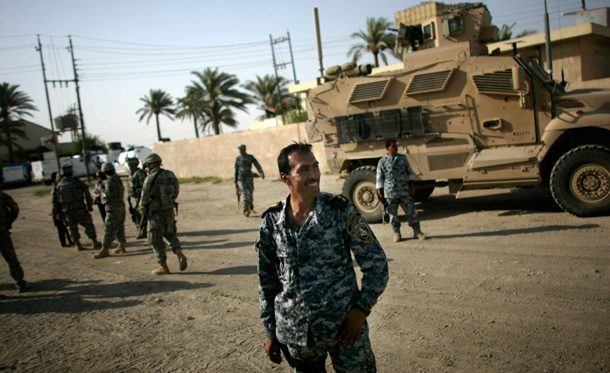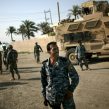In the Aftermath of Iraq’s Provincial Elections, Part One: A Dangerous Year Ahead for Iraqi Kurds
Publication: Terrorism Focus Volume: 6 Issue: 5
By:

Some ominous signs have appeared for northern Iraq’s Kurdistan Regional Government (KRG) following the January 31 nationwide provincial elections. If the elections offer an indicator of the national mood of Iraq, then in this case Iraq’s Arabs seemed to show a growing preference for Iraqi Arab nationalist political parties and a strong central government, a preference at odds with the KRG’s struggle for greater regional autonomy.
The biggest loser in the provincial elections was the Shiite Islamic Supreme Council of Iraq (ISCI) party. The ISCI went from being the hegemonic party in Iraq’s southern provinces to an embarrassing second- or even third-place showing in most southern provinces. Iraq’s Shiite prime minister, Nuri al-Maliki, emerged in turn as the elections’ biggest winner, greatly improving on the weak following his Dawa party attracted in previous elections. Al-Maliki even seems to have attracted significant numbers of votes from outside his Shiite sectarian base by downplaying religious themes in favor of Iraqi nationalist slogans and the promise of security and strong government – issues with appeal to Sunni Arabs, secular voters and even Christian Iraqis. Where he was once regarded by many as an ineffective compromise choice for Iraqi Prime Minister, al-Maliki has now managed to shape his image into that of the strong leader many Iraqis believe they need.
Iraqi Kurds view these results with concern. In Iraq’s federal level of government, the ISCI has generally worked closely with the Kurdish parties and shared their goal of a highly decentralized Iraqi federalism, with a weak central government in Baghdad. If the provincial elections indicate what the national-level parliamentary elections will look like when they are held in late 2009, Iraq’s Kurdish parties will need a few more political allies to compensate for the ISCI’s decline. If Arab Iraqi leaders think they can get more votes and support with a platform of Iraqi nationalism and strong central government, as Al-Maliki seems to have done, such political allies may become increasingly hard to find.
Part of al-Maliki’s ascendance seems to be occurring at the expense of the KRG. Kurdish relations with al-Maliki went from reasonably positive in 2006 (when Kurdish parties saved al-Maliki’s government from collapse as Shiite and Sunni parties withdrew their support), to increasingly tense in 2008 and early 2009. Much of the Iraqi Arab electorate appears resentful of Kurdish gains since 2003, and displays little patience or understanding for Kurdish demands. Politicians like al-Maliki have moved to capitalize on this resentment and burnish their Iraqi nationalist credentials. Al-Maliki and his ministers now increasingly criticize the KRG; at a press conference on November 20, 2008, al-Maliki questioned the activities of the Kurdish peshmerga militias and accused the KRG of violating Iraq’s constitution by developing an independent oil industry and opening diplomatic offices in foreign countries (IHT, December 2, 2008).
The KRG struck back by citing what it described as the Prime Minister’s own violations of the constitution:
It is unfortunate and deeply regrettable that the [November 20] press conference of Iraq’s Prime Minister illustrates efforts being made to take the people of Iraq back to a period we are desperately trying to get beyond. It was a period where the excessive concentration, or centralization, of economic and political power condemned all Iraqi peoples to unimaginable suffering….Though the Prime Minister has taken the oath to promote and protect the Constitution of Iraq – as it currently exists – it is, indeed, disconcerting when he cites the Constitution in attacking others while apparently violating it when taking unilateral decisions. The Prime Minister is obligated to act within the limits of the current constitution and not in accordance with a future constitution he may prefer (KRG.org, December 1, 2008).
KRG leaders have also condemned al-Maliki’s move to recruit and arm "support councils" in their region and the disputed territories south of it. According to the KRG, al-Maliki has approached Arab tribal leaders in northern Iraq (including those who had collaborated in Saddam’s military campaigns against Kurdish rebels) in an apparent effort to create a militia directly loyal to him (KRG.org, December 1, 2008). KRG President Masoud Barzani has also accused al-Maliki of marginalizing Kurds in the Iraqi army while appointing his own people to head each of Iraq’s 16 army divisions, rather than following the legal parliamentary procedure of choosing such commanders by consensus (Los Angeles Times, "Interview with Kurdistan President Massoud Barzani," January 12).
Additionally, al-Maliki has deployed Iraqi army units northwards to areas the Kurds want to incorporate into their autonomous region. The Kurdish Autonomous Region of today consists simply of the areas from which Saddam Hussein withdrew his forces in 1991, and does not include many predominantly Kurdish areas just south of 1991’s "Green Line." One such mostly Kurdish town south of the autonomous region is Khanequin, where al-Maliki suddenly sent an Iraqi army brigade in August, 2008, to "help with security." The Arab Iraqi army unit nearly traded fire with the Kurdish peshmerga sent to intercept them before mediation led both forces to agree that neither group would enter the town.
For towns just south of the Kurdish autonomous region’s accidental borders – like Khanequin, Makhmour, Kalar, and Chamchamal – the significant oil resources around them only add to the determination of both Baghdad and the KRG to control them. The multi-ethnic demography of larger towns like Kirkuk and Mosul – with Kurdish, Arab, Turkmen, and Christian populations – further complicates the issue. Kurdish leaders who would negotiate away historic claims to areas like Kirkuk or surrender any measure of Kurdish autonomy would undoubtedly be committing political suicide. Although Article 140 of the 2005 Iraqi Constitution stipulates that these areas must have a referendum to decide whether or not to join the KRG region, several deadlines for the referendum (the first in December 2007) have already come and gone. Kirkuk did not even get to vote in the 2009 provincial elections, as disagreements over who gets to vote in that province still await resolution (the three KRG provinces of Dohuk, Erbil and Sulaymaniya did not have provincial elections either, since they are functioning under a separate KRG electoral calendar). A deadline of March 31, 2009, for a special parliamentary committee to table a new Kirkuk election law will probably be missed as well. In Diyala and Nineweh provinces just south of the KRG, Kurds largely controlled the provincial councils (as they do in Kirkuk) due to a 2005 electoral boycott by Arab Sunnis. Last month’s electoral results mean they will be expected to relinquish control of Nineweh (Mosul) to the Sunni Arab Hadba party (which garnered 48.4 percent of the vote to the Kurdish Alliance’s 25.5 percent) and control of Diyala to the Sunni Arab Iraqi Islamic Party (which garnered 21.1 percent of the vote to the Kurdish Alliance’s 17.2 percent).
These developments, combined with Prime Minister al-Maliki’s increasingly tense relations with Kurdish leaders, seem to foreshadow a difficult year ahead for Iraqi Kurds and their leaders. As the security situation in the center and south of Iraq improves, an increasingly confident al-Maliki-led government appears less conciliatory and more aggressive towards Iraqi Kurdistan. According to The Economist, "Mr. Barzani is said to have recently told Mr. Maliki to his face: ‘You smell like a dictator’" (November 27, 2008). Arab Iraqi voters in turn appear to be rewarding al-Maliki for his assertiveness.
Iraq’s Kurds may hope that divisions among the Arab Iraqi political parties remain serious enough to force some of them to maintain Kurdish allies. Failing the emergence of a fractious, weak, and inward-focused political scene in Baghdad, Iraqi Kurds risk a difficult time ahead. If the government in Baghdad continues to consolidate, KRG leaders may find few friends in the region (besides the mountains) to turn to in case of political difficulties, especially given the current plans to withdraw U.S. troops within two years.





